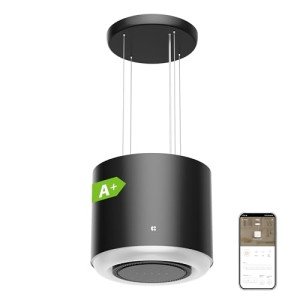10 Island Extractor Fan Tricks Experts Recommend
페이지 정보

본문

Everything You Need to Know About Island Extractor Fans
Island extractor fans, frequently referred to as island hoods or island range hoods, are vital appliances in modern kitchens, particularly those with cooking islands. These versatile gadgets not only enhance the aesthetic appeal of a kitchen but also play a vital role in keeping air quality by eliminating smoke, steam, grease, and odors generated throughout cooking. This post delves into the various aspects of island extractor fans, including their performances, types, installation ideas, and upkeep.
What is an Island Extractor Fan?
An island extractor fan is a type of kitchen ventilation system developed to hang from the ceiling and is usually set up above a kitchen island. Unlike standard wall-mounted hoods, island extractors are focused over the cooking area, offering unblocked airflow and effective extraction capabilities.
Key Functions of Island Extractor Fans:
- Air Filtration: Island extractors filter out smoke, steam, and grease particles from the air, helping to keep your kitchen and home environment clean.
- Odor Removal: By expelling undesirable cooking smells, these fans ensure a more pleasant cooking experience.
- Improved Air Quality: Maintaining great air quality is important for health and wellness; island extractor fans help accomplish this by venting out contaminants.
- Visual Appeal: With numerous designs available, island fans can also function as a stylish centerpiece in contemporary kitchen designs.
Types of Island Extractor Fans
Island extractor fans can be categorized based upon their style and performance, which can affect their option for different kitchens. Below are the main types of island Island extractor fans extractors:
| Type | Description |
|---|---|
| Ducted Hoods | These hoods expel air outside through ductwork, supplying optimal ventilation. They require more intricate setup due to the requirement for ducts. |
| Ductless Hoods | These hoods filter air and recirculate it back into the kitchen. They are much easier to install however might be less efficient for heavy cooking. |
| Convertible Hoods | These versatile hoods can operate as either ducted or ductless, giving homeowners versatility based on their kitchen design. |
Picking the Right Type
Aspects affecting the kind of island extractor fan for island hob fan you choose include your cooking practices, kitchen design, and whether you have access to external venting.
Setup of Island Extractor Fans
Installing an island extractor fan requires careful factor to consider and preparation to ensure optimal performance and security. Here's a detailed guide to facilitate efficient setup:
Installation Steps:
Determine Placement: Identify the ideal location for the extractor fan, guaranteeing it is placed directly above the cooking area.
Measure Ceiling Height: Ensure compliance with suggested height allowances which typically recommend installing the fan in between 24 to 30 inches above the cooktop.
Install Electrical Wiring: Ensure that the place has access to electrical points and, if appropriate, ductwork for venting.
Protect Structural Support: Since island extractors hang from the ceiling, it's necessary to offer appropriate assistance, frequently requiring additional brackets or framing.
Mount the Hood: Following the manufacturer's guidelines, safely attach the hood to the ceiling.
Link Ductwork (if necessary): For ducted cooker hoods for islands, link the necessary ductwork in accordance with building regulations.
Test Functionality: Once installed, run the fan to guarantee it operates correctly and efficiently.
Maintenance Tips for Island Extractor Fans
Regular upkeep assists in prolonging the life of island extractor fans and preserving ideal efficiency. Here are a couple of upkeep pointers:
- Clean Filters: Depending on the type, either tidy or replace filters occasionally-- typically every 3 months.
- Wipe Down Surfaces: Clean the exterior surface areas frequently to avoid grease accumulation.
- Inspect for Obstructions: Ensure the exhaust ducts are clear of any clogs to keep airflow.
- Check Electrical Components: Regularly examine electrical wiring and connections to ensure whatever is in safe working order.
Often Asked Questions (FAQs)
1. How do I understand if I require a ducted or ductless island extractor fan?
Choosing between ducted and ductless depends on your kitchen design. If your kitchen can accommodate ductwork that leads outside, a ducted fan is preferable for ideal ventilation. Nevertheless, if ductwork installation is unwise, a ductless fan may be an ideal alternative.
2. How noisy are island extractor fans?
Noise levels vary significantly amongst different designs. Usually, search for fans with a sound score of 60 decibels or lower for a quieter operation.
3. Can I install an island extractor fan myself?
While DIY installation is possible, it's recommended to hire a professional, especially for ducted models, to guarantee compliance with building regulations and security policies.
4. How often should I clean up the filters of an island extractor fan?
It's advisable to clean or replace the filters every three months or when you notice minimized performance in air filtering.
5. What is the typical expense of an island extractor fan?
Rates can range significantly based on brand name, model, and features, generally costing anywhere from ₤ 300 to ₤ 2,000. Setup costs must also be thought about.
In summary, island extractor fans (related) are essential in preserving a clean and effective cooking environment. They not only improve kitchen looks however likewise improve air quality and cooking experience. By understanding the types available, setup procedures, and maintenance regimens, house owners can make educated choices regarding their kitchen ventilation needs. Valuing the significance of these devices can influence the general performance and comfort of a modern-day kitchen.

- 이전글Why Is Glass Repair So Popular? 25.05.19
- 다음글9 Lessons Your Parents Teach You About Window Doctor Near Me 25.05.19
댓글목록
등록된 댓글이 없습니다.



